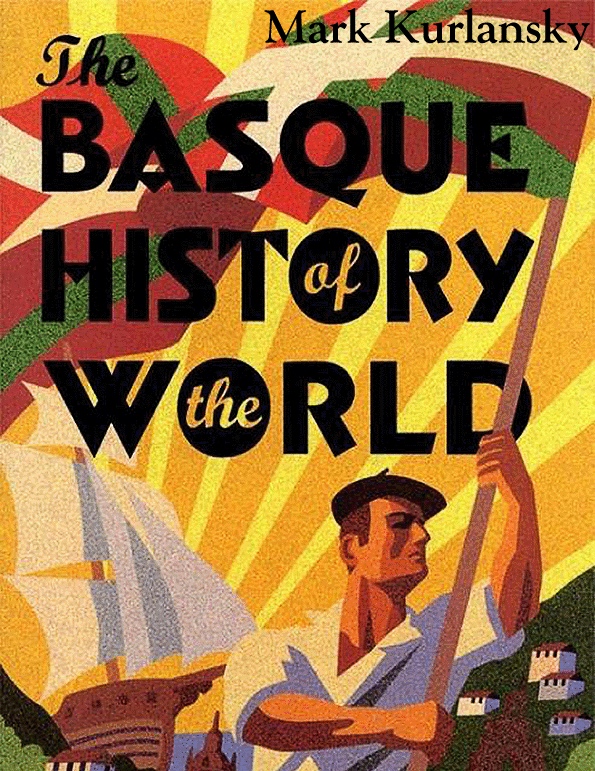
The Basque History of the World
کتاب های مرتبط
- اطلاعات
- نقد و بررسی
- دیدگاه کاربران
نقد و بررسی

Starred review from October 4, 1999
Straddling the border of southern France and northern Spain, the land of the Basques has long been home to a people who had no country of their own but have always viewed themselves as a nation. In this marvelous work of cultural history and appreciation, Kurlansky traces Basque history from pre-Roman times, when Basques worked as the mercenaries of Carthage, to the region's recent renaissance in language and arts. Along the way, he explains how the Basques came to be among Europe's first whalers, capitalists, explorers, industrialists and international traders. As he did in Cod, Kurlansky fuses political and economic history with delightful digressions into cultural and culinary traditions (several delicious recipes are included). The book is as politically loaded with opinion as it is culturally informative: Kurlansky expresses sympathy for the cause of Basque independence, arguing that many of Spain's current policies toward its Basque minority are holdovers from the repressive Franco regime. He also tends to accept the claim that the Basques "are the original Europeans," largely on the ground that Euskera, the Basque language, appears to have no linguistic relative and is likely the oldest European language still spoken. For all the ground it covers, this wildly informative work is a marvel of clarity, glittering with unusual facts and marked by penetrating insights into a people always "making complex choices about the degree of independence that was needed to preserve their way of life, while looking to the rest of the world for commercial opportunities to ensure their prosperity." 56 illustrations, 6 maps, 10 recipes. Agent, Charlotte Sheedy Agency. 5-city author tour. (Oct.) FYI: Cod received the James Beard Award for Excellence in Food Writing and was a New York Public Library Best Book of 1997.

Starred review from October 1, 1999
Kurlansky, a foreign correspondent (and the author of Cod, an LJ Best Book of 1997), spent years in the Basque provinces covering the resistance movement for the International Herald Tribune. His passion for the Basques is obvious, but this book is by no means a political tract. Part history, part travelog, part contemporary journalism, it traces the Basque story from its ancient origins to the immediate present. Enriching the text with old photographs, maps, excerpts from Basque literature, and even several recipes, Kurlansky provides rare insight into this mysterious "nation without a country." He argues that the fiercely nationalistic Basques have offered a great deal to Western culture, detailing their contributions to fishing, whaling, shipbuilding, and industry, arguing that they were the first Europeans to cultivate tobacco, and suggesting that they were responsible for popularizing chocolate in Europe. Finally, he outlines the emergence of Basque nationalism. This fascinating and very readable book should interest scholars and informed lay readers alike. Highly recommended for all libraries.--Marie Marmo Mullaney, Caldwell Coll., NJ
Copyright 1999 Library Journal, LLC Used with permission.

Starred review from October 15, 1999
One of the most intriguing disclosures, for most readers, of Kurlansky's superb trade history with recipes, "Cod" (1997), was that, in search of the nutritious fish, Basque fishermen "discovered" America, quite possibly centuries before Columbus. In his new book, Kurlansky shows that that was just one first or near-first for the mysterious people who have inhabited the western foothills of the Pyrenees and the angle of the Bay of Biscay since Paleolithic times, perhaps, but certainly long before the French and Spanish who claim Basque lands as part of their nations arrived. The Basques speak a language unrelated to any other, yet Basque literature arose as late as the 1890s. The Basques anticipated the rest of Europe as capitalists, selling shares in fishing expeditions. In the eighteenth century, the Basque city Bilbao became the major iron producer in Europe, and though the English displaced them by inventing steel smelting, Basque industrialists regained much lost business as soon as they obtained Bessemer converters. Most important, the Basques have been shining examples of nationalists uninterested in empire and, often in their history, even uninterested in being a political entity. They have historically coexisted with powerful neighbors by insisting primarily upon keeping their own laws and customs, which during most of the twentieth century have been denied them, leading to the creation of self-conscious, militant nationalism and the label "Basque separatist," which Kurlansky's absorbing popular history attests does not accurately reflect what most Basques desire. They are a singularly admirable people whose distinctive character combines deep conservatism and high adventurousness. And they can and have cooked brilliantly, including, incidentally, ingredients from outside Europe, such as corn, that they adopted long before other Europeans. Kurlansky gives recipes to prove that point--of course! ((Reviewed October 15, 1999))(Reprinted with permission of Booklist, copyright 1999, American Library Association.)

























دیدگاه کاربران